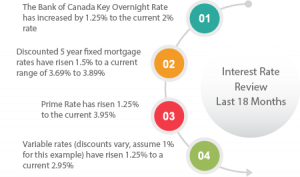During most of the last 28 years, choosing a 5-year variable at any random date would lead to lower interest costs for the following five years. The thing to understand is the last 28 years we have been in the greatest bull bond market in the history of the world, that means the greatest interest rate decline over the longest period ever. The last 28 years were a great time to have a variable rate mortgage. The question now is, what will be the average variable interest rate for the next five years?
- The first thing for a borrower to determine is, do they have the emotional ability to accept rate and payment increases during the term.
- The second thing is, do they have the financial skill to budget and pay fluctuating and higher payments, or do they like the stability of a fixed payment.
If they can deal with variability, we now enter the world of genies, tarot cards, and educated guesswork.
Interest Rate Overview, In the last 18 months
The Governor of the Bank of Canada says the “Goldilocks zone” overnight rate (not too accommodating and not too restrictive), would fall in the 3.5 -4% range (this range may be dropping). With a whole bunch of assumptions, please note that range is close to, if not a double, from current rates. The Canadian Government and the Bank of Canada both are comfortable, expect, they are leaning towards/want higher interest rates.
 Rates have gone up and are expected to continue going up as long as we have an expanding economy and rising inflation expectations. This is despite Alberta’s current economic state.
Rates have gone up and are expected to continue going up as long as we have an expanding economy and rising inflation expectations. This is despite Alberta’s current economic state.
Predicting Rates for the Next five years.
Lock in and take five years in the higher 3’s(The 5-year Fixed):
- let’s say 3.79%, for example,
- $400,000 mortgage interest over five years $70,458.”
Here is a guess at future rates:
Take a variable and we will guess the Bank of Canada overnight interest rates rising by 0.5 % in the next six months by 1% in the next year after that, by 0.75 % the next year, at this point we would have prime of 5.5% and variable at 4.5% and in the last year and a half of our 5-year term have rates coming down by 0.75 %. To summarize:
- Prime from 3.95% today up to 5.5% in three years or so and then back down a bit to 4.75%
- Guess what, interest charged over the five years works out to $69,700
We are as well, guessing on continued economic expansion and then a world or North American or Canadian recession of a mild sort. No vicious recessions. No expansion forever either. Expansion ending sometime in the next year to 2 years.
We come back to “what to do?”
A reasonable guess on rates suggests, the decision of fixed versus variable, it’s a tossup for the next half year or so. Then the traditional advantage for variable will likely become more obvious.
Last year when fixed rates were below 2.5%, fixed was a clear winner. That was one of the rare periods. However, as rates rise a bit and the economic cycle appears to become more traditional, our answer again is it really about emotional make-up… If you want interest rate and payment stability, choose fixed. If you want the most likely chance at lower interest charges, choose variable (Especially once the next cycle turns).
Many factors can play into the decision besides emotional make-up, financial cushion, debt service ratios, other major necessary purchases during the term, payout penalties.
It is a choice most people ignore and simply request a 5-year fixed, which is revealing in and of itself. People should at least consider Variable.
Article originally posted by: Croft Axsen – Broker Owner Jencor Mortgage Corporation
